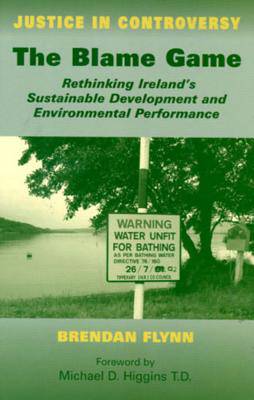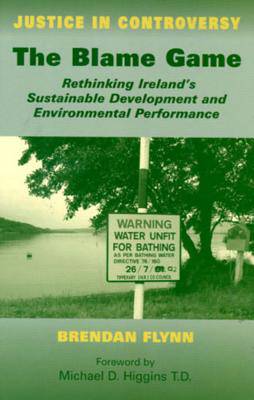
Bedankt voor het vertrouwen het afgelopen jaar! Om jou te bedanken bieden we GRATIS verzending (in België) aan op alles gedurende de hele maand januari.
- Afhalen na 1 uur in een winkel met voorraad
- In januari gratis thuislevering in België
- Ruim aanbod met 7 miljoen producten
Bedankt voor het vertrouwen het afgelopen jaar! Om jou te bedanken bieden we GRATIS verzending (in België) aan op alles gedurende de hele maand januari.
- Afhalen na 1 uur in een winkel met voorraad
- In januari gratis thuislevering in België
- Ruim aanbod met 7 miljoen producten
Zoeken
The Blame Game
Rethinking Ireland's Sustainable Development and Environmental Performance
Brendan Flynn
€ 34,95
+ 69 punten
Uitvoering
Omschrijving
Dr Flynn covers all of the above questions and more in his new book The Blame Game. A must-read for anyone interested in environmental issues in Ireland. Ireland's record in the field of environmental protection is one of the worst in Europe, and this book explores the reasons why. It examines the evolution of Irish environmental policy over the so-called 'Celtic Tiger' years of Ireland's economic boom while looking to the future as well. It considers why Ireland's environmental performance has been so lacklustre during this period, and what scope exists for improvement. The emphasis is placed primarily on institutional aspects of Irish environmental policy. In particular, this book offers a strong critique of the current Irish style of reaching environmental decisions, an excessive dependence on legal instruments, and a weak Irish local government system. The author further argues that Ireland has developed an institutional style of policy-making that urgently needs reform. He suggest a number of discreet but related problems that need to be understood and addressed. These include an excessive adversarial style of interaction between environmentalists, the Irish state, and business - the 'blame game' described in the title. Also fatal, is a complacency among the Irish policy elite, who have chosen to downplay environmental problems and continue to think of environmental policy as merely about corrective regulation, rather than adopting the wider and more ambitious vision of sustainable development. Individual chapters cover a range of topics, and the book will appeal to readers interested in comparative environmental policy and politics, the role of institutions in environmental policy-making, or indeed anyone keen to understand the post 'Celtic Tiger' politics and society of an Ireland in transition.Ã?Â?Ã?Â?
Specificaties
Betrokkenen
- Auteur(s):
- Uitgeverij:
Inhoud
- Aantal bladzijden:
- 278
- Taal:
- Engels
- Reeks:
Eigenschappen
- Productcode (EAN):
- 9780716528395
- Verschijningsdatum:
- 1/01/2007
- Uitvoering:
- Hardcover
- Formaat:
- Genaaid
- Afmetingen:
- 152 mm x 229 mm
- Gewicht:
- 526 g

Alleen bij Standaard Boekhandel
+ 69 punten op je klantenkaart van Standaard Boekhandel
Beoordelingen
We publiceren alleen reviews die voldoen aan de voorwaarden voor reviews. Bekijk onze voorwaarden voor reviews.









